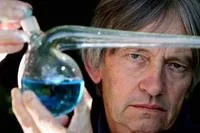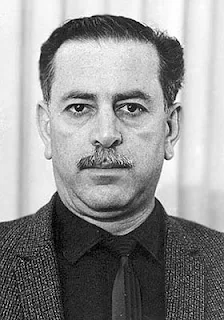 John Studebaker "Jack" Hardy
John Studebaker "Jack" Hardy was an
American lyrical
singer–songwriter and
playwright based in
Greenwich Village, who was influential as a writer, performer, and mentor in the
North American and
European folk music scenes for decades died from complications of lung cancer he was , 63. . He was cited as a major influence by
Suzanne Vega,
John Gorka, and many others who emerged from that scene in the 1970s, 1980s, and 1990s. Hardy was the author of hundreds of songs, and toured tirelessly for almost forty years. He was also the founding editor of
Fast Folk Musical Magazine, a periodical famous within music circles for twenty years that shipped with a full album (and later, compact disc) in each issue, whose entire catalog is now part of the
Smithsonian Folkways collection.
Hardy died on the morning of March 11, 2011 in Manhattan. He was 63. The cause was complications of
lung cancer.
| (November 23, 1947 – March 11, 2011) |
Career

Jack Hardy was strongly identified with New York's Greenwich Village folk music scene. Beginning in the mid-1970s, Hardy hosted Monday-night songwriter's circles and pasta dinners at his apartment on Houston Street (pronounced "HOW-stun"), a gathering famously open to both established artists and novices. He also began a small, informal songwriters' group at The English Pub in Greenwich Village, which later became a more formal songwriters' night at the
Cornelia Street Cafe in December 1977. This group would later evolve into the Songwriter's Exchange, releasing an album on Stash Records in 1980. Eventually, the group formed a cooperative, led by Hardy, and in 1981 took over the booking of the Speakeasy, which became a thriving venue for songwriters. Hardy was also the founder and first editor of
Fast Folk Musical Magazine in 1982. Hardy is a graduate of the
Pomfret School in
Connecticut and the
University of Hartford.
Although more popular in Europe than in his native
America for much of his career, the end of the 20th Century brought a reignited interest in his music on his native shores. Throughout, he toured tirelessly on both sides of the Atlantic. Hardy was a lyrical writer; his songs were political, although usually subtly so. His music was often tinged with a Celtic flavor, although his last few albums took on more of a country & western style. Both budget-conscious and disdainful of self-important artistic egos, Hardy recorded all of his albums (almost 15 of them, in a 40-years career) in the same manner: by rehearsing a small band and then recording the entire album "live to tape" in a period of 48 hours or less. In the last few years of his life, Hardy toured with long-time friend and fellow songwriter
David Massengill as a duo called the Folk Brothers.
In songwriter circles, Hardy was as well-known as a teacher and mentor as he was as an artist. Songwriters gathered at his hallowed Houston Street apartment one night a week to play their latest (and usually unfinished) work, and to face criticism from Hardy and their gathered peers. Fueled by pasta and wine, the weekly songwriters' sessions were famous for the artistic and political conversations that flowed in them and the large number of remarkable songs that emerged from them. Jack suffered neither egos nor nerves, and when the introduction to a new song got too long and/or apologetic from a songwriter, Hardy would bark, "Shut up and sing the song." The hundreds of songwriters who frequented Hardy's apartment gatherings over the years included names both unknown and famous – among them,
Suzanne Vega,
Shawn Colvin,
Brian Rose,
Richard Shindell,
John Gorka,
Wendy Beckerman,
Richard Julian,
Christian Bauman,
Linda Sharar,
Rod MacDonald,
Lucy Kaplansky, and
Christine Lavin. The weekly songwriter's session itself made it into a number of songs by Hardy alumni, including "Jack's Crows" by
John Gorka, the title song of Gorka's second album, and "Boulevardiers" by Suzanne Vega. The group was also immortalized in fictional form in
Christian Bauman's 2008 novel "In Hoboken," which included two chapters that took place in the Houston Street apartment, and a character named "Geoff Mason" who bore a striking (and, according to a public radio interview with Bauman, intentional) resemblance to Hardy.
While Hardy's name never achieved the level of fame of Vega, Gorka, or the many he recorded for Fast Folk (including
Tracy Chapman,
Lyle Lovett,
David Wilcox, or
The Roches), he continually built on his substantial catalog of literate, well-crafted songs.
Hardy attended college at The University of Hartford, and in 1969 – then editor of the
University of Hartford's The News-Liberated Press – Hardy was arrested and convicted of libel after publishing a lewd cartoon that attacked then president
Richard Nixon. Hardy was convicted and paid a $50 fine. While the conviction was later overturned on appeal, Hardy remains the only person in the history of the United States that has ever been arrested and convicted of libeling the President of the United States.
[1]
Jack Hardy was predeceased by a brother, Jeff, who played bass in Jack's band and appeared on many of his recordings. Jeff Hardy, who worked as a chef for a financial services firm located in the World Trade Center, died in the
terrorist attacks of September 11, 2001.
Discography
- Jack Hardy (1971)
- Early and Rare (1965–1974, vol. 1 of The Collected Works of Jack Hardy)
- Mirror of My Madness (1976)
- The Nameless One (1978)
- Landmark (1982)
- White Shoes (1982)
- The Collected Works of Jack Hardy, Part I, Volumes 1 - 5, 1965–1983
- The Cauldron (1984)
- The Hunter (1987)
- Retrospective (1990)
- Through (1991)
- Two of Swords (1992)
- Civil Wars (1994)
- Songs of Jack Hardy (tribute), Volume One: Of the White Goddess (1995)
- The Collected Works of Jack Hardy, Part II, Volumes 6 - 10, 1984–1995
- The Passing (1997)
- Omens (2000)
- Bandolier (2002)
- Coin of the Realm: Songs for the New American Century (2004)
- The Tinker's Coin - Celtic Anthology (2005)
- Noir (2007)
To see more of who died in 2010
click here
 John Lawrence Nettleship was a British schoolteacher who taught chemistry at Wyedean School, Gloucestershire died from cancer.he was 71, . His pupils there included Joanne Rowling, whose mother worked for some time as an assistant in his department. He has been claimed as a major inspiration for the character of Severus Snape in Rowling's Harry Potter series of fantasy books.
John Lawrence Nettleship was a British schoolteacher who taught chemistry at Wyedean School, Gloucestershire died from cancer.he was 71, . His pupils there included Joanne Rowling, whose mother worked for some time as an assistant in his department. He has been claimed as a major inspiration for the character of Severus Snape in Rowling's Harry Potter series of fantasy books. Nettleship was born in Nottingham, and studied Chemistry at the University of Leeds in the late 1950s. He joined the Labour Party at that time, and remained an active member for the rest of his life. After leaving university, he taught in Birmingham, where he married and had three children; the marriage later ended in divorce and he remarried in the 1980s.[1]
Nettleship was born in Nottingham, and studied Chemistry at the University of Leeds in the late 1950s. He joined the Labour Party at that time, and remained an active member for the rest of his life. After leaving university, he taught in Birmingham, where he married and had three children; the marriage later ended in divorce and he remarried in the 1980s.[1]












